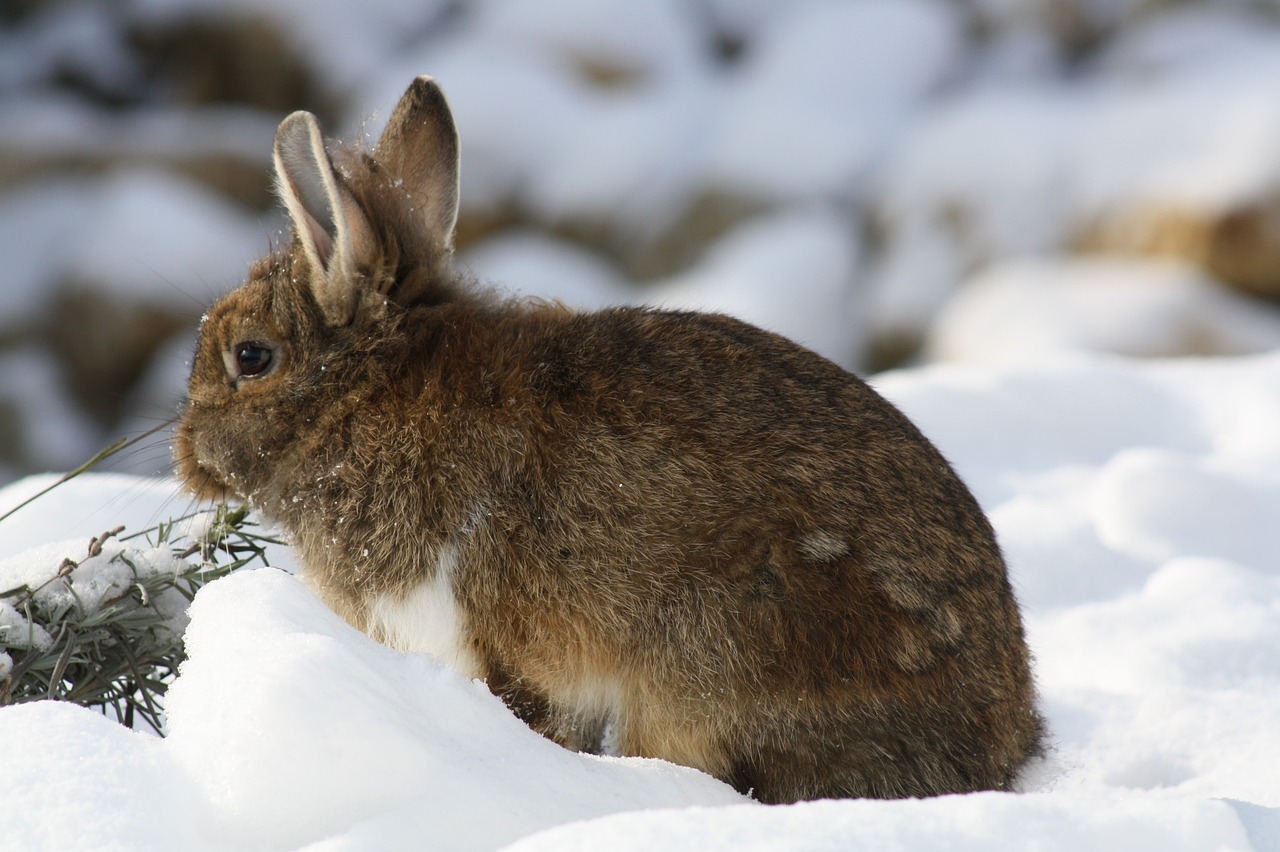Rabbits are adorable and popular pets known for their fluffy tails, twitching noses, and gentle demeanor. While they can make wonderful companions, it’s essential to provide them with a safe and comfortable environment, especially during the cold winter months. Many rabbit owners wonder whether it’s safe to keep their bunnies outside during winter, and if so, what precautions they should take.
In this comprehensive guide, we’ll explore the factors to consider when deciding if your rabbits can stay outside in winter and how to ensure their well-being during the colder seasons.
Understanding Rabbits and Cold Weather
Before we delve into the specifics of keeping rabbits outside during winter, let’s take a closer look at how rabbits are naturally adapted to handle cold weather. Understanding their biology and behavior is crucial to making informed decisions about their care.
Rabbit Fur and Insulation
Rabbits have a dense, insulating coat that helps them regulate their body temperature. Their fur consists of two types: the outer guard hairs and the softer undercoat. This combination provides excellent insulation, keeping them warm in cold weather and cool in hot weather. The thickness and length of a rabbit’s fur can vary depending on its breed, but all rabbits have some degree of natural insulation.
Burrowing Instinct
In the wild, rabbits dig burrows to escape extreme temperatures, including both heat and cold. These burrows offer protection from harsh weather conditions, predators, and provide a stable microclimate where they can maintain a moderate temperature. Pet rabbits may not have the same opportunity to dig burrows, but understanding this instinct can help us create a suitable environment for them in captivity.
How Rabbits Regulate Temperature
Rabbits have a limited ability to regulate their body temperature compared to humans. They rely on external conditions to stay comfortable. When it’s cold, they conserve heat by curling up and reducing their activity. Conversely, in hot weather, they may become more active during cooler parts of the day or night. This means that during winter, your rabbit’s environment plays a crucial role in their comfort and well-being.
Factors to Consider
Now that we have a basic understanding of how rabbits handle cold weather, let’s explore the key factors to consider when deciding whether your rabbits can stay outside in winter.
1. Rabbit Breed
Different rabbit breeds have varying levels of tolerance to cold temperatures. Some breeds, like the Alaskan, have thick fur and are more cold-resistant, while others, like the Rex, have shorter and less insulating fur. If you have a breed that is less adapted to cold weather, you should be more cautious about keeping them outside during winter.
2. Outdoor Housing
If you’re considering keeping your rabbits outside during winter, you’ll need to provide them with suitable outdoor housing. A well-insulated hutch or shelter is essential to protect them from the cold, wind, and precipitation. Ensure that the enclosure is draft-free and elevated to prevent moisture from seeping in. Adequate bedding inside the hutch is crucial to keep your rabbits warm.
3. Location
The location of your rabbit’s outdoor housing is critical. Choose a sheltered spot that is shielded from strong winds and direct sunlight. This will help maintain a more stable temperature inside the hutch and protect your rabbits from extreme weather conditions.
4. Extreme Temperatures
Consider the average winter temperatures in your region. Some areas experience mild winters with only occasional cold snaps, while others have consistently frigid conditions. If you live in an area with extreme and prolonged cold weather, it may not be safe to keep your rabbits outside unless you can provide a heated and well-insulated shelter.
5. Health and Age of the Rabbit
The health and age of your rabbits are significant factors to consider. Young rabbits, elderly rabbits, or rabbits with pre-existing health issues may be more susceptible to the cold. It’s crucial to monitor them closely and consult with a veterinarian to ensure their well-being during winter.
6. Socialization
Consider the social aspect of keeping rabbits outside. If your rabbits are used to interacting with you and being part of your family indoors, suddenly relocating them to an outdoor hutch during winter can be stressful. Rabbits are social animals that thrive on companionship, so think about how this change may affect their mental and emotional well-being.
7. Frostbite and Hypothermia
Frostbite and hypothermia are real concerns for rabbits exposed to extremely cold temperatures. Rabbits are susceptible to frostbite in their ears, nose, and extremities. Signs of frostbite include pale or discolored skin, swelling, and pain. Hypothermia occurs when a rabbit’s body temperature drops dangerously low. Symptoms include shivering, lethargy, and a loss of coordination. These conditions can be life-threatening, so it’s crucial to be vigilant and take preventive measures.
8. Diet and Hydration
During the winter months, rabbits may need more calories to maintain their body temperature. Ensure they have access to a well-balanced diet and fresh water at all times. Monitor their food and water intake, as rabbits may consume more in cold weather. Frozen water bottles can be a concern, so use heated water bowls or check their water supply frequently to prevent freezing.
9. Exercise and Mental Stimulation
Rabbits need regular exercise and mental stimulation to stay happy and healthy. If you decide to keep them outside during winter, provide a secure outdoor play area where they can hop and explore. Additionally, offer enrichment activities like toys and tunnels to prevent boredom and keep their minds active.
10. Veterinary Care
Regular veterinary check-ups are essential to monitor your rabbits’ health, especially during winter. Cold weather can exacerbate existing health issues, so consult with your veterinarian to ensure your rabbits are in good condition for outdoor living.
Preparing Your Rabbits for Winter
If you’ve carefully considered the factors mentioned above and believe that your rabbits can stay outside in winter, it’s crucial to prepare them and their outdoor habitat properly. Here are the steps to ensure their comfort and safety:
1. Insulated Hutch or Shelter
Invest in a well-insulated hutch or shelter that is weatherproof and draft-free. You can add extra insulation in the form of straw or blankets to help retain heat. Make sure the hutch is elevated to prevent moisture from seeping in and freezing.
2. Proper Bedding
Inside the hutch, use appropriate bedding material such as straw or hay. This provides additional insulation and warmth. Ensure that the bedding stays dry, as wet bedding can lead to health issues for your rabbits.
3. Ventilation
While it’s essential to keep the hutch draft-free, you should also provide proper ventilation to prevent condensation and maintain air quality. Adequate ventilation helps reduce humidity inside the hutch, which can contribute to respiratory problems.
4. Weatherproofing
Inspect the hutch regularly for any gaps, cracks, or holes that may allow cold air and moisture to enter. Seal these openings to maintain a comfortable environment for your rabbits.
5. Heating
Consider using safe heating options if needed. Avoid using space heaters or heat lamps, as they can pose fire hazards. Instead, opt for pet-safe heating pads or mats designed for outdoor use. Ensure that these heating elements are placed in a way that your rabbits cannot chew on the cords.
6. Outdoor Play Area
Create a secure outdoor play area where your rabbits can exercise and get fresh air during the winter months. This area should be protected from predators and provide a safe space for your rabbits to explore.
7. Food and Water
Monitor your rabbits’ food and water supply regularly. Provide them with a balanced diet, including hay, fresh vegetables, and a high-quality rabbit pellet mix. Ensure access to unfrozen water at all times by using heated water bowls or frequently checking their water supply.
8. Frostbite and Hypothermia Prevention
Inspect your rabbits daily for signs of frostbite or hypothermia. Pay special attention to their ears, nose, and extremities. If you notice any symptoms, seek immediate veterinary care.
9. Regular Interaction
Continue to interact with your rabbits regularly to provide socialization and mental stimulation. Spend time with them, offer treats, and provide toys and tunnels to keep them engaged.
10. Veterinary Care
Schedule regular veterinary check-ups for your rabbits, especially during the winter months. A veterinarian can assess their health and offer guidance on any specific care needs.
Alternatives to Outdoor Living
If you have concerns about keeping your rabbits outside during winter or live in an area with extremely harsh winters, there are alternatives to consider:
1. Indoor Housing
Bringing your rabbits indoors for the winter is a safe option, especially if you can provide them with a dedicated living space within your home. This ensures they are protected from extreme cold and allows for more consistent temperature regulation.
2. Garage or Shed
If you don’t have the space indoors, consider converting a garage, shed, or unused room into a rabbit-friendly environment. These areas can be insulated and heated to create a comfortable living space for your rabbits during the colder months.
3. Playpen or Exercise Area
If you prefer to keep your rabbits outside but want to protect them from the elements, consider using a playpen or exercise area with a sheltered section. This allows your rabbits to enjoy some outdoor time while staying safe and warm.
Conclusion
Whether or not rabbits can stay outside in winter depends on various factors, including their breed, outdoor housing, location, and the severity of the winter climate. It’s essential to carefully assess these factors and take appropriate measures to ensure your rabbits’ well-being and safety during the colder months. Providing a well-insulated hutch or an indoor alternative, monitoring their health, and offering a balanced diet are all key components of responsible rabbit ownership. Ultimately, your rabbits’ comfort and safety should be your top priority, so make decisions that prioritize their welfare in any weather.








